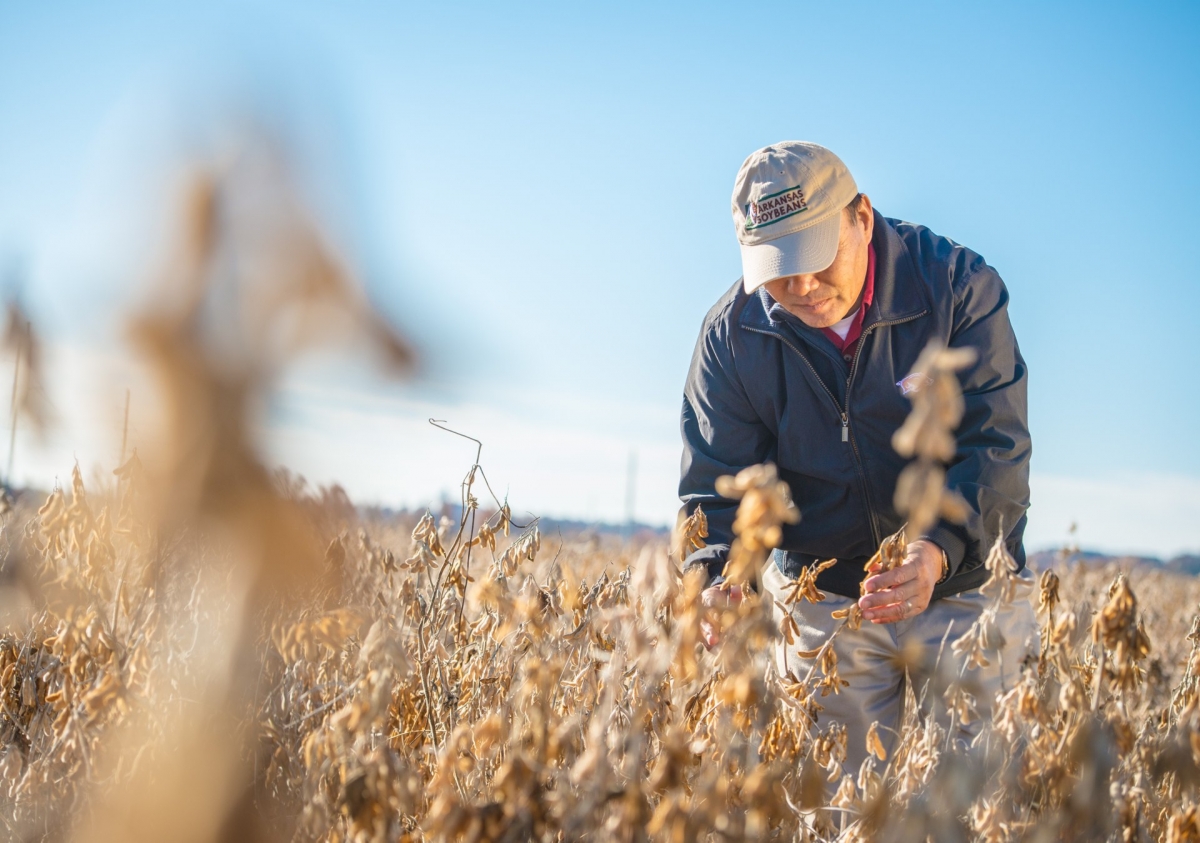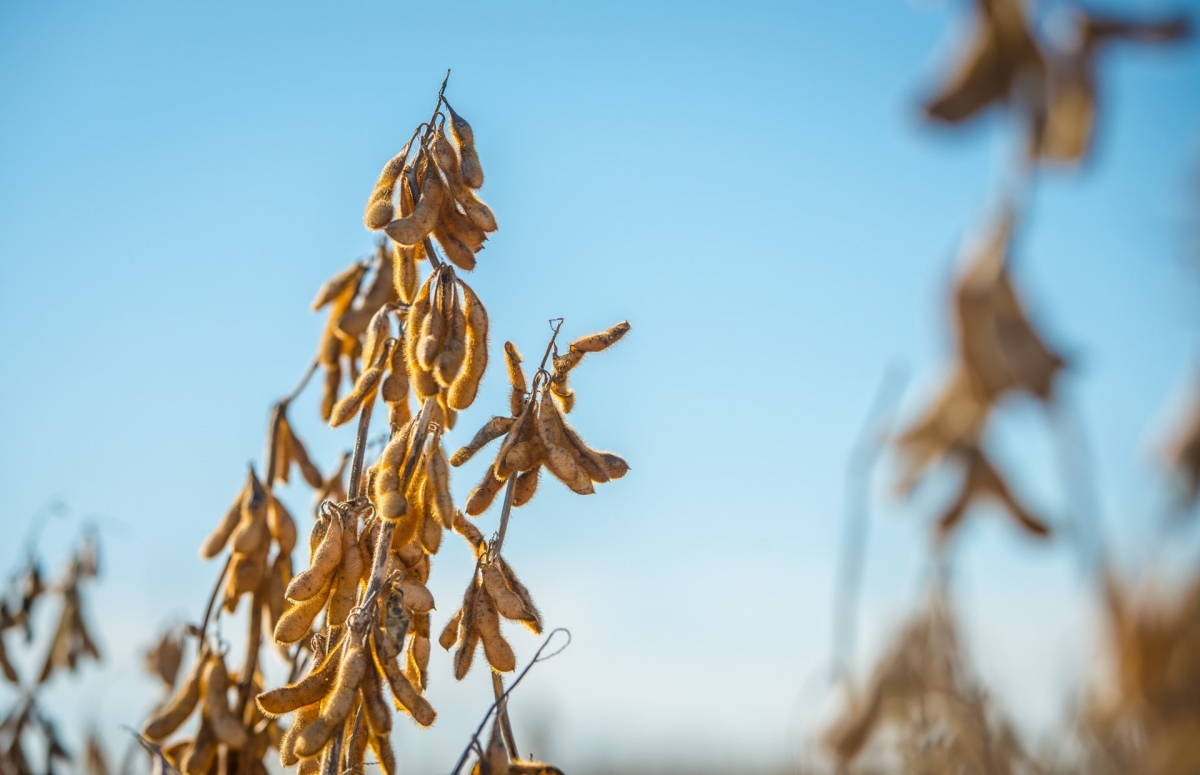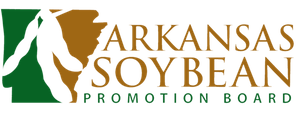Improved Soybean Cultivars
Breeding Soybean Cultivars with High Yield Potential, Improved Seed Quality Traits, and Multiple Disease Resistance and Pre-foundation Seed Production
Investigator(s): Dr. Pengyin Chen, UA Division of Agriculture Soybean Breeder, and colleagues: David Moseley, Tina Hart, Max Wyss, Jody Hedge, Bill Apple, Jonathan McCoy, and Scott Hayes
Stated Goal: To provide a steady flow of new and improved soybean cultivars (varieties) with high productivity and profitability to the soybean industry.
Specific Objectives:
1. Develop high-yielding maturity group (MG) 4-6 varieties that include both Roundup Ready and non-GM lines that are adapted to various environments and production systems in Arkansas.
2. Develop new varieties and germplasm that have resistance to soybean cyst nematode (SCN), root knot nematode (RKN), sudden death syndrome (SDS), stem canker (SC), frogeye leaf spot (FLS), and soybean mosaic virus (SMV).

Progress Report:
Due to the growing interest among soybean growers for conventional (non-GM) varieties, the soybean breeding program of the University of Arkansas has, for decades, released high-yielding conventional (Non-GM) public varieties. In 2013, foundation seeds of 2 new determinate maturity group 5 high yielding conventional cultivars, UA5213 C (880 units) and UA 4913 C (121 units) were produced. Both of these varieties are competitive with commercial MG late 4 and early 5 cultivars available in southern states. In addition, the Arkansas Foundation Seed program produced Foundation Grade seed of Osage, Ozark, UA 5612 (released in 2012), and Hutcheson with 848, 783, 552, and 419 units, respectively.
Pre-foundation seed (130 units) of a new large-seeded conventional cultivar (R08-4004), which is well suited for tofu and soymilk market products, was also produced in 2013. This is a large line that has a yellow hilum and is a mid-MG 5 maturity. Additionally 365 units of a late MG 4 conventional line, R09-4571, with indeterminate growth habit and tawny pubescence color, was also produced in 2013 and is scheduled to be released in 2014.
Additionally a total of 504 and 500 units of pre-foundation seed for Roundup Ready (RR-1) lines R04-1268RR and R04-1250RR, respectively, were produced in 2013. These lines will be released in 2014. We are also in the process of releasing two new high yielding conventional (non-GM) lines, R05-374 and R09-430; small-scale pre-foundation seed were produced in 2013. In 2013, a total of 7 RR1 and 4 RR2Y lines were produced for breeder seed production in preparation for future release. Moreover, 5 high oil lines with 23-25% oil, 3 high protein lines with 45-46% protein, 2 low linolenic lines with 1.8 – 2.3% linolenic, and 3 sugar lines with 9 % sucrose and < 1 % stachyose were grown for breeder seed production.
A tota l of 23 specialty lines (6 high oil, 6 high protein, 8 modified fatty acid, and 3 high sucrose and low stachyose/phytate) with competitive yields were evaluated in the 2013 Southern Regional Quality Traits Test. Data will be provided in the next report.
l of 23 specialty lines (6 high oil, 6 high protein, 8 modified fatty acid, and 3 high sucrose and low stachyose/phytate) with competitive yields were evaluated in the 2013 Southern Regional Quality Traits Test. Data will be provided in the next report.
A total of 9 and 28 advanced high-yielding lines were evaluated in 2013 Arkansas Soybean Variety Tests and the 2013 USDA Southern Regional Uniform/Preliminary Tests, respectively. The best performing line(s) will be chosen for future release.
Also evaluated in 2013 were 185 advanced and 408 preliminary conventional lines, 54 advanced and 86 preliminary RR1 lines, 81 advanced and 211 preliminary RR2Y lines, 54 advanced and 84 preliminary genetic diversity lines, 54 advanced and 72 preliminary drought tolerant lines, 32 advanced disease resistant lines, 20 preliminary SDS resistant lines, 9 preliminary soybean cyst nematode resistant lines, 7 preliminary frog eye leaf spot resistant lines. In addition, specialty lines were tested in 2013: 64 advanced and 135 preliminary high protein, 44 advanced and 64 preliminary high oil, 47 advanced and 223 preliminary modified fatty acid (low linolenic, low sat, and high oleic), 11 advanced and 85 preliminary high sugar/low phytate. A total of 743 plant populations were also evaluated for breeding purposes. In addition, 16,617 progeny rows were evaluated in 2013 and 2,345 of which were selected for 2014 preliminary tests.
Foundation Seed
Pengyin Chen Soybean Breeder, University of Arkansas
There has been an increasing interest among soybean growers in conventional (non-GMO) cultivars.
The Arkansas Foundation Seed Program received orders of 2184 unites; 795 units of Osage, 441 units of Ozark and 948 units of UA 5612. Below is a summary of production for 2013 Foundation Seed.
|
Name |
Project |
ID |
Acres |
Yield (bu/ac) |
Protein (%) |
Oil (%) |
|
Osage |
CV |
5.6DPGTnIb |
40 |
68.6 |
43.6 |
20.8 |
|
Ozark |
CV |
5.2DPGTn(Bf/Ib) |
30 |
61.6 |
40.2 |
22.6 |
|
UA 4913C (R05-3239) |
CV |
4.9DPTTnBl |
8 |
75.4 |
40.6 |
22.2 |
|
UA 5612 |
CV |
5.6DPGTnIb |
80 |
70.8 |
41.2 |
22 |
|
UA 5213C (R05-4114) |
CV |
5.0DPGTn(Bf/Ib) |
80 |
71.1 |
41.6 |
21.6 |
|
R09-4571 |
CV |
5EWT.Bl |
15 |
54.6 |
40.6 |
22.3 |
